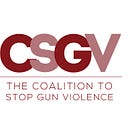
Member-only story
It’s Time to Retire the Term “Red Flag Laws”
The catchy nickname stigmatizes individuals with mental health disabilities and mischaracterizes the way these evidence-based laws operate.
When our team first heard the term “red flag law,” we didn’t think much of it. It wasn’t our preferred name for the policy we had helped develop, but the substance of these laws was more important than what they were called. The policy was what mattered. The efficacy was what mattered. Saving lives was what mattered. What others were calling this law wasn’t a major concern. It wasn’t a priority. A user-friendly nickname for an effective policy wasn’t going to undermine our efforts to save lives. We didn’t think it was hurting anyone. Until we realized it was.
Since 2014, the Coalition to Stop Gun Violence (CSGV) has been a leader in drafting, passing, and enacting extreme risk laws — sometimes called “red flag laws” — which allow family members and/or law enforcement officials to petition a judge to temporarily remove firearms from individuals who are behaving dangerously. When we helped pass this law in California, it was a first-of-its-kind policy; now, more than a dozen states and the District of Columbia have extreme risk laws.
CSGV has been thrilled to see extreme risk laws gain bipartisan popularity and support among advocates, lawmakers, and citizens alike. But as these laws have become more mainstream, the question of what to call them has become more important — and the term “red flag law” has become more troubling. Over time — especially after many conversations with our allies in the mental health community — it has become clear that the term “red flag law” is not just a memorable, innocuous nickname. It is a term that has the potential to alienate marginalized groups. And by mischaracterizing the way these laws operate, “red flag” is a term that jeopardizes the policy’s impact.
These problems stem from the vague nature of the name “red flag.” Because the term is so indefinite in meaning, it is easy to corrupt. It is easy to mischaracterize the policy’s mechanisms and purpose — whether intentionally or unintentionally.
For instance, citizens and legislators may believe the term “red flag” encompasses or…
